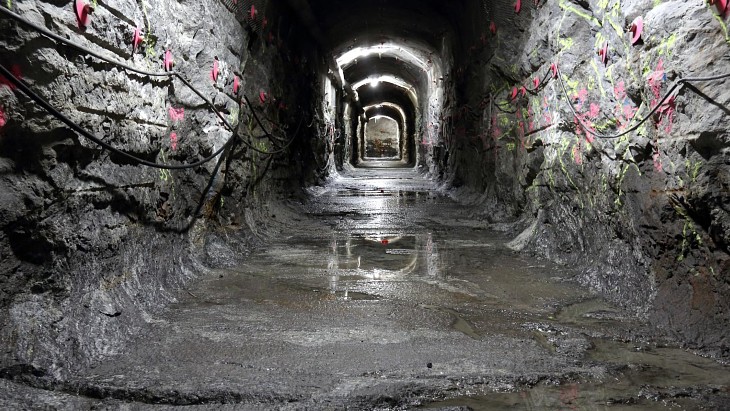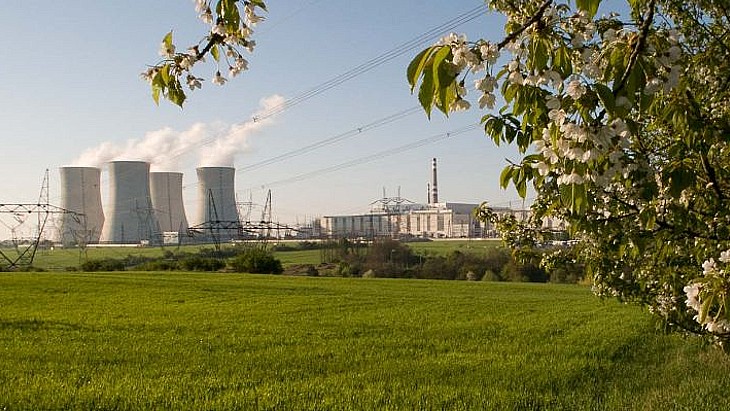The report - titled Carbon Neutrality in the UNECE Region: Technology Interplay under the Carbon Neutrality Concept - builds on the input from international experts and data scientists from across UNECE regions. The publication - the first UN-regional led modelling of the energy system - identifies a range of technology and policy solutions for the region to attain carbon neutrality by 2050.
The report presents three scenarios: a reference scenario, a base 'carbon neutrality' scenario and a 'carbon neutrality innovation' scenario. The reference scenario presumes no sustainable energy or climate policies and accordingly fails to achieve carbon neutrality. The innovation scenario focuses on the potential benefits of innovation and deployment policies that accelerate the market uptake of innovative technologies. For nuclear power it includes large-scale reactor designs and new small modular reactors (SMRs), and additional energy services beyond electricity, such as hydrogen production.
The study focused on the UNECE region, which includes the countries of Europe, but also countries in North America, Central Asia and Western Asia. They employed the same base assumptions as the Shared Socioeconomic Pathway 2 scenario - the so-called 'middle of the road' climate scenario where historical patterns of economic development are continued throughout the 21st century. They did not take account of the consequences of Russia's invasion of Ukraine, which began well after the project was initiated.
.jpg)
(Image: UNECE)
In the base Carbon Neutrality scenario, nuclear energy essentially doubles its existing generation in the UNECE region by the year 2050. Nuclear energy provides 4400 TWh out of total electricity generation of 22,100 TWh, or about 20% of the total. In the Carbon Neutrality Innovation scenario, with large scale nuclear and SMRs, the amount of generation from nuclear energy approximately triples compared with the present day, with 6235 TWh representing nearly 30% of total electricity generation. This is produced from 874 GWe of installed nuclear capacity, of which 450 GWe is projected to be SMRs.
.jpg)
(Image: UNECE)
.jpg) (Image: UNECE)
(Image: UNECE)
.jpg)
(Image: UNECE)
General conclusions
To attain carbon neutrality, the key takeaways of the report show that the UNECE region must:
⦁ diversify primary and final energy supply with all low- and zero-carbon technologies;
⦁ accelerate phase-out of unabated fossil fuels;
⦁ scale-up electrification of all sectors with emphasis on renewable energy and nuclear power;
⦁ and build capacity to support widespread innovation of low- and zero-carbon technologies such as carbon capture, use and storage (CCUS), hydrogen and advanced nuclear power.
The report calls for increased technology transfer and deployment and institutional capacity to plan and drive ambitious transformation of energy systems. According to UNECE, these actions will support buy-in and adoption from all stakeholders and help to build secure, affordable, and carbon-neutral energy systems.
These actions need to start now and maximise the use of all low- and zero-carbon technologies. To achieve carbon neutrality by 2050, it is crucial that governments raise awareness about the merits of all low- and zero-carbon technologies, develop policy frameworks in support of carbon neutrality, and finally create a level-playing field to finance a just transition toward carbon-neutral energy systems aligned to the needs of member states.
If the technology development and deployment are delayed in any way, or if a technology is removed from an agenda, the forecast for achieving carbon neutrality will need to be revisited.
"Inaction is a policy choice that will lead to greater, possibly insurmountable, challenges in the future," said UNECE Executive Secretary Olga Algayerova. "Only bold, immediate, and sustained action can decarbonise energy in time to avoid a climate disaster.
"This report is a bleak reminder that increased investment in conventional fossil fuels is delusional when viable low- and zero-carbon technologies exist. Governments must embrace policy frameworks in support of carbon neutrality and create a level-playing field to finance a just transition toward carbon-neutral energy systems."
UNECE views on nuclear
UNECE describes nuclear power as "an essential low-carbon electricity and heat source contributing to carbon neutrality" and that countries which decide to deploy nuclear power "can play an essential role in decarbonising the UNECE energy systems".
The report notes that the push for decarbonisation of energy systems, alongside increased energy prices and improved safety measures are changing attitudes towards nuclear power. This is creating new markets for the penetration of the current large-scale reactors and advanced nuclear power technologies. However policy support is needed to mitigate the financial risk and high capital cost of completing large-scale nuclear power plants and to accelerate the development and deployment of SMRs.
In addition, extending the operation of existing reactors is expected to significantly ease the use and dependency on fossil fuels and the cost of energy without the financial risks and long-term obligations attached to new energy projects.
Concluding the carbon neutrality project
The report is part of the UNECE Carbon Neutrality project - a major UNECE initiative that included a series of technology briefs on low-carbon energy technologies and a state-of-the-art environmental lifecycle assessment on electricity generation options. World Nuclear Association supported the UNECE Carbon Neutrality project and coordinated the nuclear input into the project. All the project results are accessible in the Carbon Neutrality toolkit, a tool designed to support policymakers in making informed decisions towards the implementation of the 2030 Agenda for Sustainable Development and the Paris Agreement.
King Lee, Vice Chair of the UNECE Group of Experts on Cleaner Electricity Systems and Director of the World Nuclear Association’s Harmony programme, presented at the 18th Session of the UNECE Group of Experts on Cleaner Electricity Systems the findings from the Carbon Neutrality project on the role of nuclear energy for attaining carbon neutrality.
World Nuclear Association Director General Sama Bilbao y León commented: "I welcome the publication of the UNECE Carbon Neutrality toolkit. This provides a bold and pragmatic roadmap to achieving net-zero for Europe, North America,and Central Asia.
"The Carbon Neutrality project has highlighted the important role that nuclear energy must play in the energy transition, a role which only grows when experts start to consider including large-scale reactors and advanced innovative reactors, such as SMRs, as ways to decarbonise sectors beyond electricity, such as heat and hydrogen production."

.jpg)





_53514_33880.jpg)






